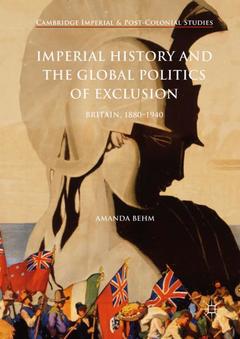Description
Imperial History and the Global Politics of Exclusion, 1st ed. 2018
Britain, 1880-1940
Cambridge Imperial and Post-Colonial Studies Series
Language: English
Subjects for Imperial History and the Global Politics of Exclusion:
Support: Print on demand
Description
/li>Contents
/li>Biography
/li>Comment
/li>
Examining the rise of the field of imperial history in Britain and wider webs of advocacy, this book demonstrates how intellectuals and politicians promoted settler colonialism, excluded the subject empire, and laid a precarious framework for decolonization. History was politics in late-nineteenth-century Britain. But the means by which influential thinkers sought to steer democracy and state development also consigned vast populations to the margins of imperial debate and policy. From the 1880s onward, politicians, intellectuals, and journalists erected a school of thought based on exclusion and deferral that segregated past and future, backwardness and civilization, validating racial discrimination in empire all while disavowing racism. These efforts, however, engendered powerful anticolonial backlash and cast a long shadow over the closing decades of imperial rule. Bringing to life the forgotten struggles which have, in effect, defined our times, Imperial History and the Global Politics of Exclusion is an important reinterpretation of the intellectual history of the British Empire.
Chapter 1: Introduction: British imperial history and its antecedents.- Chapter 2: Breaking up the British Empire.- Chapter 3: Historical racism between page and practice, 1880-1900.- Chapter 4:History as institution: the battle for the new ‘imperial’.- Chapter 5: Empire in opposition: the stakes of history and the rise of anticolonial nationalism.- Chapter 6: Empire, history, and the Great War.- Chapter 7: The Third British Empire.- Chapter 8: Conclusion.
Amanda Behm is Lecturer in British History at the University of York, UK. She has taught previously at Yale University and the University of California, Berkeley.
Presents a new and compelling interpretation of the the intellectual worlds and motives at the heart of the late British empire
Demonstrates precisely how racism served as the bulwark for imperial rule, as well as its undoing
Offers a new way of thinking about the relationship between ideas and action in British, Imperial, Anglo-American, and international history
Includes supplementary material: sn.pub/extras
These books may interest you

Imperialism and Postcolonialism 209.69 €



